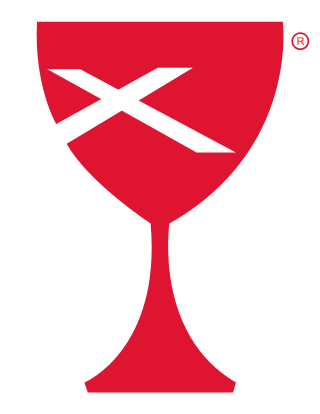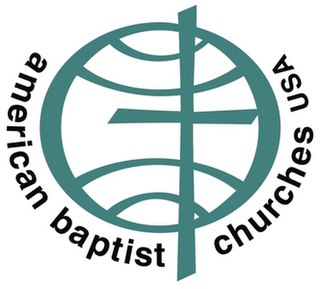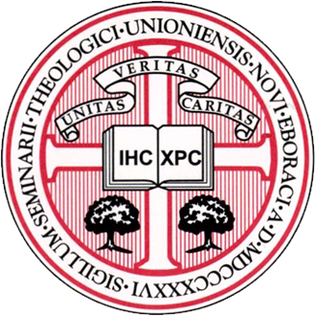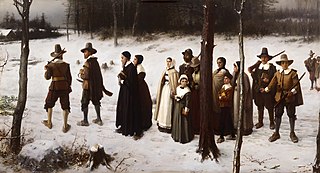
The Christian Church (Disciples of Christ) is a mainline Protestant Christian denomination in the United States and Canada. The denomination started with the Restoration Movement during the Second Great Awakening, first existing during the 19th century as a loose association of churches working towards Christian unity, then slowly forming quasi-denominational structures through missionary societies, regional associations, and an international convention. In 1968, the Disciples of Christ officially adopted a denominational structure at which time a group of churches left to remain nondenominational.

Ecumenism – also called interdenominationalism, transdenominationalism, or ecumenicalism – is the concept and principle that Christians who belong to different Christian denominations should work together to develop closer relationships among their churches and promote Christian unity. The adjective ecumenical is thus applied to any interdenominational initiative that encourages greater cooperation and union among Christian denominations and churches.

The American Baptist Churches USA (ABCUSA) is a Baptist Christian denomination established in 1907 originally as the Northern Baptist Convention, and from 1950 to 1972 as the American Baptist Convention. It traces its history to the First Baptist Church in America (1638) and the Baptist congregational associations which organized the Triennial Convention in 1814. Headquartered in Valley Forge, Pennsylvania, ABCUSA is usually considered mainline, although varying theological and mission emphases may be found among its congregations, including modernist, charismatic and evangelical orientations.

Morningside Heights is a neighborhood on the West Side of Upper Manhattan in New York City. It is bounded by Morningside Drive to the east, 125th Street to the north, 110th Street to the south, and Riverside Drive to the west. Morningside Heights borders Central Harlem and Morningside Park to the east, Manhattanville to the north, the Manhattan Valley section of the Upper West Side to the south, and Riverside Park to the west. Broadway is the neighborhood's main thoroughfare, running north–south.

The United Church of Christ (UCC) is a socially liberal mainline Protestant Christian denomination based in the United States, with historical and confessional roots in the Congregational, Continental Reformed, and Lutheran traditions, and with approximately 4,700 churches and 745,230 members. The UCC is a historical continuation of the General Council of Congregational Christian churches founded under the influence of New England Pilgrims, as well as Puritans. Moreover, it also subsumed the third largest Calvinist group in the country, the German Reformed.

The Christian Reformed Church in North America is a Protestant Calvinist Christian denomination in the United States and Canada. Having roots in the Dutch Reformed Church of the Netherlands, the Christian Reformed Church was founded by Dutch immigrants in 1857 and is theologically Calvinist.
The National Council of the Churches of Christ in the USA, usually identified as the National Council of Churches (NCC), is the largest ecumenical body in the United States. NCC is an ecumenical partnership of 38 Christian faith groups in the United States. Its member communions include mainline Protestant, Eastern Orthodox, African-American, evangelical, and historic peace churches. Together, it encompasses more than 100,000 local congregations and 40 million adherents. It began as the Federal Council of Churches in 1908, and expanded through merger with several other ecumenical organizations to become the National Council of Churches in 1950. Its Interim President and General Secretary is Bishop Vashti Murphy McKenzie.

The mainline Protestant churches are a group of Protestant denominations in the United States and in some cases Protestant denominations in Canada largely of the theologically liberal or theologically progressive persuasion that contrast in history and practice with the largely theologically conservative Evangelical, Fundamentalist, Charismatic, Confessional, Confessing Movement, historically Black church, and Global South Protestant denominations and congregations. Some make a distinction between "mainline" and "oldline", with the former referring only to denominational ties and the latter referring to church lineage, prestige and influence. However, this distinction has largely been lost to history and the terms are now nearly synonymous.

Union Theological Seminary in the City of New York (UTS) is a private ecumenical Christian liberal seminary in Morningside Heights, Manhattan, affiliated with neighboring Columbia University. Since 1928, the seminary has served as Columbia's constituent faculty of theology. In 1964, UTS also established an affiliation with the neighboring Jewish Theological Seminary of America. UTS confers the following degrees: Master of Divinity (MDiv), Master of Divinity & Social Work dual degree (MDSW), Master of Arts in Religion (MAR), Master of Arts in Social Justice (MASJ), Master of Sacred Theology (STM), and Doctor of Philosophy (PhD).

Founded in 1855, the Chicago Theological Seminary (CTS) is the oldest higher education institution in the City of Chicago and was established with two principal goals: first, to educate pastors who would minister to people living on the new western frontier of the United States and second, to train ministers who would advance the movement to abolish slavery. Originally started under the direction of the abolitionist Stephen Peet and the Congregational Church by charter of the Illinois legislature, CTS has retained its forward-looking activist outlook throughout its history, graduating alumni who include civil rights activists Jesse Jackson Sr. and Howard Schomer, social reformer Graham Taylor, and anti-Apartheid activist John W. de Gruchy. It is one of six seminaries affiliated with the United Church of Christ and follows an ecumenical tradition that stresses cooperation between different Christian denominations as well as interfaith understanding.
The Religious Coalition for Reproductive Choice (RCRC) is an abortion rights organization founded in 1973 by clergy and lay leaders from mainline denominations and faith traditions to create an interfaith organization following Roe v. Wade, the 1973 U.S. Supreme Court decision legalizing abortion in the U.S. In 1993, the original name – the Religious Coalition for Abortion Rights (RCAR) – was changed to the Religious Coalition for Reproductive Choice.

The Interdenominational Theological Center (ITC) is a consortium of five predominantly African-American denominational Christian seminaries in Atlanta, Georgia, operating together as a professional graduate school of theology. It is the largest free-standing African-American theological school in the United States.
The Washington Theological Consortium is an ecumenical organization of Christian theological schools and interfaith partners located in Washington, DC, Virginia, Maryland, and Pennsylvania. Members cooperate to deepen ecumenical unity in theological education and to broaden interfaith dialogue and understanding and to prepare both clergy and laity with skills they need to minister in a diverse church and society. The Consortium is one of the most diverse of its kind in the nation, as it includes Roman and Byzantine Catholic traditions, mainline Protestants, Evangelicals, and Historic Black Divinity schools; with partners in spiritual formation, Jewish, and Islamic education.

Church Women United (CWU) is a national ecumenical Christian women's movement representing Protestant, Roman Catholic, Orthodox and other Christian women. Founded in 1941, as the United Council of Church Women, this organization has more than 1,200 local and state units in the United States and Puerto Rico. CWU's members represent 26 supporting denominations and organizations. Offices are located in New York City, Washington DC and at the United Nations.

The New York Theological Seminary (NYTS) is a private non-denominational Christian seminary in New York City. It was founded in 1900 as the Bible Teacher's College.

The General Commission on Christian Unity and Interreligious Concerns (GCCUIC) addresses the interreligious and ecumenical concerns of The United Methodist Church. The GCCUIC's office is located at The Interchurch Center in New York City. The Commission's President is Bishop Mary Ann Swenson and the General Secretary is Stephen J. Sidorak Jr. The Ecumenical Officer of the Council of Bishops is Bishop Sharon Zimmerman Rader and serves as the corporate ecumenical officer of The United Methodist Church, working in collaboration with GCCUIC.
This article describes the relationship between the Seventh-day Adventist Church and other Christian denominations and movements, and other religions. Adventists resist the movement which advocates their full ecumenical integration into other churches, because they believe that such a transition would force them to renounce their foundational beliefs and endanger the distinctiveness of their religious message. According to one church document,

Auburn Theological Seminary, located in New York City, teaches students about progressive social issues by offering workshops, providing consulting, and conducting research on faith leadership development.

Protestantism is the largest grouping of Christians in the United States, with its combined denominations collectively comprising about 43% of the country's population in 2019. Other estimates suggest that 48.5% of the U.S. population is Protestant. Simultaneously, this corresponds to around 20% of the world's total Protestant population. The U.S. contains the largest Protestant population of any country in the world. Baptists comprise about one-third of American Protestants. The Southern Baptist Convention is the largest single Protestant denomination in the U.S., comprising one-tenth of American Protestants. Twelve of the original Thirteen Colonies were Protestant, with only Maryland having a sizable Catholic population due to Lord Baltimore's religious tolerance.
The National Council of Congregational Churches of the United States was a mainline Protestant, Christian denomination in the United States. Its organization as a denomination was delayed by the Civil War. Congregational leaders met again in Boston, Massachusetts in 1865, where they began to hammer out standards of church procedures (polity) and adopted a statement of faith, known as the Burial Hill Declaration. Denominational organization came in 1871 with formation of the National Council of Congregational Churches, which existed until its merger in 1931. In 1928, there were 5,497 Congregational churches in the U.S. with a membership of 939,130. These churches were served by 5,648 ministers.


















